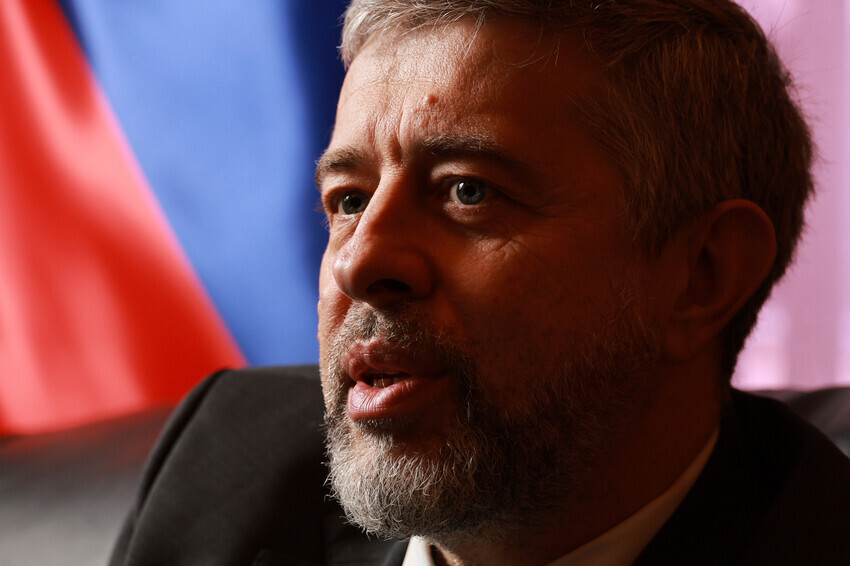
When asked on Wednesday about the chill in South Korea-Russia relations during the presidency of Yoon Suk-yeol, Russia’s ambassador to South Korea says that Russia isn’t at fault for the current difficulties in the bilateral ties. The envoy also said that Moscow doesn’t want Seoul providing weapons to Ukraine that could be used to kill Russian service members and civilians.
Ambassador Georgy Zinoviev, who represents Russia in Seoul, also mentioned the warm relations between North Korea and Russia, including speculation that Russian President Vladimir Putin will soon be visiting the North.
The envoy also stressed that his country’s relationship with North Korea does not violate, or seek to violate, the interests of any other country.
Zinoviev enthusiastically presented the Russian point of view over the course of an 80-minute interview with the Hankyoreh at the Russian Embassy in downtown Seoul on Wednesday.
Hankyoreh: In an interview with the Russian press on Dec. 18, you referred to South Korea as being the “friendliest of the unfriendly states.” How do you rate relations between the two sides?
Zinoviev: South Korea was placed on Russia’s list of “unfriendly states” as a country that had no real choice about participating in the sanctions against Russia. The South Korean government’s decision runs counter to the warm sentiments that remain between our two countries’ peoples. I think that if South Korea were to withdraw or revoke its sanctions, it would probably be taken off the list of unfriendly states.
Russia is not the party responsible for creating the current difficulties in our relationship. Russia is South Korea’s neighbor. We look forward to our bilateral relationship returning to a course of friendliness and good neighborliness in the future.
Hankyoreh: There have been reports of South Korea indirectly supplying weapons to Ukraine.
Zinoviev: We cannot tolerate weapon support to Ukraine, whether it is indirect or direct. We do not want South Korea to provide Ukraine with weapons that can be used to kill Russian soldiers and civilians. Weapon assistance can cause grave damage to Russia-South Korea relations as a whole, and that’s why we have warned about that.
Hankyoreh: There are also reports of North Korean-made shells being found in Ukraine.
Zinoviev: How can you be 100% certain that those are North Korean rockets? When it comes to the situation in Ukraine, more fake news has circulated than you can count.
The relationship between Russia and the Democratic People’s Republic of Korea does not violate or target any third country’s interests. Western media have continued to fan controversy over the relationship between Russia and North Korea in an attempt to divert attention away from the difficulties and failures that Western countries have encountered in Ukraine.
If there really is any evidence proving military cooperation between Russia and North Korea, such as photographs, it should be presented to the UN and handled there rather than being circulated in the media.
Hankyoreh: Last month, North Korean Foreign Minister Choe Son-hui visited Russia and met with President Vladimir Putin. Some have voice concerns that Russia could provide North Korea with ballistic missile or spy satellite technology.
Zinoviev: I have nothing to comment on those reports.
Hankyoreh: While Russian Deputy Minister of Foreign Affairs Andrey Rudenko was visiting South Korea on Feb. 1, Foreign Ministry spokesperson Maria Zakharova somewhat unusually condemned as “biased” President Yoon Suk-yeol’s remarks criticizing North Korea’s legislation of preemptive nuclear weapon use.
Zinoviev: I have no comment on the spokesperson’s remarks. That being said, I think that Deputy Minister Rudenko’s visit allowed for the two countries to exchange views frankly and have a very beneficial dialog. We rate his visit as a plus rather than a minus for bilateral relations.
By Seo Young-ji, staff reporter; Jang Ye-ji, staff reporter
Please direct questions or comments to [[email protected]]